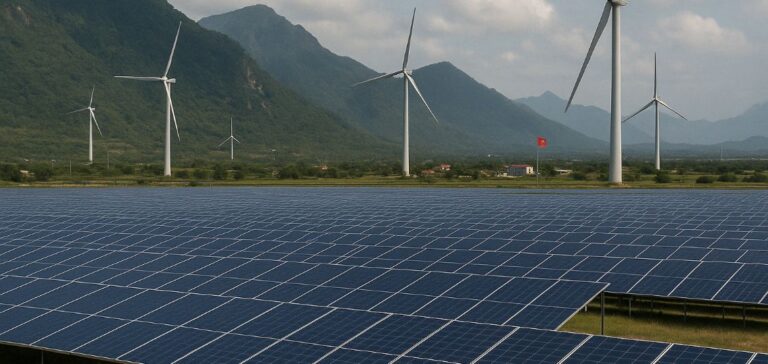The Vietnamese government has released a revised version of its Power Development Plan 8 (PDP8), setting new ambitious targets for solar and onshore wind capacity by 2030. The plan, published on the government’s official portal, now outlines 73 gigawatts (GW) of installed solar capacity and 38 GW for onshore wind by the end of the decade. These figures represent a substantial increase compared to the previous 2023 version of the plan, which aimed for 12.8 GW of solar and 21 GW of wind power.
Energy mix reform and regulatory objectives
This recalibration is part of an energy policy aimed at gradually reducing the country’s reliance on coal while meeting growing demand. The new plan projects coal will make up 17% of the energy mix in 2030, down from 20% in 2023, with a complete phase-out by 2050. Solar energy is expected to account for 31% of national production by 2030, while onshore wind should reach 16%. The government anticipates more than $136 billion in investment to implement these targets.
Strengthening investment frameworks
The PDP8 revision comes at a time when the country’s infrastructure capacity remains a limiting factor. Until 2020, solar energy developed rapidly in Vietnam, but was later hindered by insufficient transmission infrastructure. The new targets imply significant expansion of both infrastructure and regulatory frameworks. According to Andri Prasetiyo, a researcher at the Senik Centre Asia, these goals are now more achievable considering developments in the regulatory and industrial landscape.
Revival of the nuclear programme under bilateral framework
The plan also foresees the commissioning of the country’s first nuclear power plant no later than 2035. This direction builds on an agreement signed in January between Vietnam and the Russian Federation. Russian state nuclear corporation Rosatom expressed interest in a collaboration in Ninh Thuan province, where two projects had previously been approved in 2009 before being suspended in 2016. These projects, which also involved the Japanese consortium Jined, were halted due to environmental and financial concerns. The revival of the nuclear programme now requires a full revision of the associated regulatory framework.






















